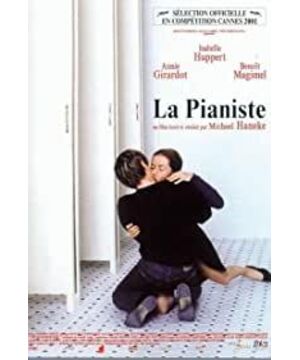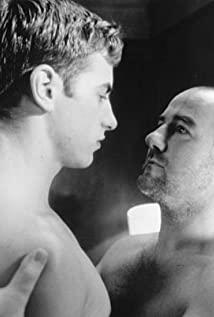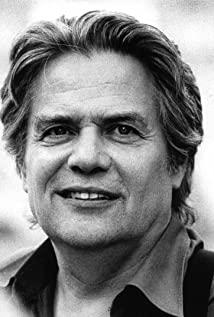1) The origin of the metamorphosis - the distortion of the Electra complex
The Electra complex, which is the Electra complex, and the Oedipus complex, which is the Oedipus complex, are Freud's initial wishes in childhood. Parents are the first object of every human sexual impulse.
The heroine's family is broken. Her father is in the hospital because of schizophrenia. The absence of her father makes her yearn for fatherly love. She follows the path of Electra to narcissism. She is the breadwinner at home and shares her bed with her mother. She also beats her mother, but always apologizes. However, her mother is not the object of her love, because her mother has a strong desire to control her. , in which she suffered too many setbacks. Her mother will be furious because she bought a new dress, and her sexuality will be strictly restricted. Her mother is like a spokesperson for religion and social etiquette, invading the last self space of the heroine. Only obedience can May sustain a weak source of love. The heroine seems to be independent and strong, but she is not willing to fall into the abyss of loneliness completely.
2) Beginning of perversion - ego and its three masters (id, superego, other)
Freud proposed that in the three subsystems of personality (id, ego, and superego), the ego must serve both the id and the superego, and at the same time face various others.
According to Marcuse's "Eros and Civilization": From an individual point of view, personality is "the final product of a long historical process"①, and gradually becomes a state of rigidity. Those who are still in the embryonic state have only the id in themselves, that is, the instinctual world. When confronted with the principle of reality, they form an organic self that coordinates the id and the outside world. The ego, which is essentially dependent on the id, seeks to modify and protect the pleasure principle, to achieve satisfaction by rejecting life-threatening impulses and zigzagging in reality. These two defense paths point to the repression of the death instinct and the erotic instinct, respectively. Death and eroticism are antagonistic relationships, the ego makes the former serve the latter. The moral constraints imposed by the outside world (parents and society) on people form the superego. On the one hand, the superego directly subordinates the ego, and on the other hand, the superego enters the unconscious through introversion in the heart, forming a person's "conscience".
In addition to the fragmented family, female teachers have to face the coercion of religion, patriarchy, and class society. Women must maintain chastity in all aspects, not a trace of coquettishness, not actively seeking sex, always maintaining female dignity, and at the same time It is also necessary to run and compete from the starting line behind. On the contrary, men can laugh cheerfully, aggressively approach the opposite sex, and can switch freely between sloppy juggling and gentleman demeanor. Faced with these powerful forces, female teachers can only always She sets up her own vigilance, she holds her hair meticulously, her face is serious and stern, and there is a clear line of demarcation between teachers and students. During the examination and examination, she sits alone in the classroom, forming a clear distinction with other teachers. Compared.
Under this all-round repression, on the one hand, the heroine's natural ability is sublimated into her comprehension of music, on the other hand, there is a rupture in her personality, and the superego becomes a sadist who is accustomed to controlling, The ego becomes a masochist thirsting for charity. As Freud put it in his analysis of Dostoevsky, "sexual masochism includes a sense of guilt eager to 'atone'." For the rest of Stoevsky's life, he identified psychological patterns that alternated between succumbing to masochistic pleasure and angry resistance. "The female teacher is also satisfied in the "guilt". In teaching, she is extremely harsh on the students, and when the female students are slightly intimate with their suitors, she feels that her position is shaken, hurt by extreme means The hand of the female student regained control; in love, she demanded that everything be commanded by herself, when to meet, when to eat, and even when to ejaculate; in private, she cut Breaking her own lower body, watching pornographic movies where women are on the abused side, peeping at other people's sex and urinating on the side, guilt and sexual stimulation bring her a double orgasm both mentally and physically.
3) The climax of perversion - the realization and shattering of daydreams
Daydreaming is an adult fantasy, an evolution of childhood play, becoming more obscure and, in Freud's view, the source of the artist's creation.
The psychological force that opposes the principle of reality is the fantasy of the unconscious realm. The excessive strength of reason in the conscious realm destroys the natural harmony within people, and "in the imagination, the individual and the whole, desire and realization, happiness and reason are reconciled". . Fantasy and eroticism are closely related, because when phantasy pursues the fulfillment of the surreal principle to the extreme, it moves towards the cancellation of the individual principle, erotic desire is the only way in which the living organism can transcend the individual and thus remain in touch with the species, and the goal of phantasy is " The reality of eroticism". The highest form of fantasy is art, and surreal art has a revolutionary significance. "Behind the aesthetic form is a lasting protest against the ruling logic of organizing life."2 What it creates is not only the beauty that has been lost in the past, but also the beauty that has been lost in the past. A real possible future dismissed as utopia.
The fanatical and handsome suitor symbolizes the realization of a daydream. She can finally have a supplier of erotic desires other than her mother, and he is her student. Teachers have a natural advantage over students. Also the reason why teacher-student romance is forbidden in many cultures, she can impose orders like crazy. In the beginning, she always refused direct sexual intercourse. On the one hand, she wanted to show her authority. On the other hand, she could not completely disobey her mother. She had to be a victim to have sexual intercourse. In the eyes of her mother, she actively sought sexual intercourse. A whore, a slut. So she wrote a letter to her suitor asking him to bind her and beat her in front of her mother, so that she would be free of responsibility and be able to enjoy the pleasures of masochism. However, after reading the letter, the suitor felt deeply disgusted with her, and he walked away. The female teacher was very frustrated, she had challenged her mother by bringing him home, and he was leaving, and she was afraid of losing everything. The next day, she chased after the male student playing ball, begging him humbly to have sex with her, she gave him lowly oral sex, but unfortunately she vomited halfway, maybe because of her inexperience as a virgin for forty years, maybe It was because she was disgusted by her posture, and in any case, the male student once again left behind. When the female teacher returned home at night, she suddenly lost control and molested her mother. After her failure in the outside world, she wanted to completely return to her family life as a father, but it was impossible. Her mother was stronger than her, even only Think of this as a kid making a house.
4) Perverted Ending - Dead Instinct
The death instinct is the part of the instinct that transforms the organic into the inorganic, through destruction to return to a state of nirvana of total tranquility (cancellation or desperate venting of excitement), including sadism and masochism. The erotic instinct is the effort to unite the organism into a larger unity, to achieve immortality (maintain excitement) through reproduction, including cell division, human reproduction, etc. The nature of oppressing, hurting others and the self comes from the death instinct. The change of the death instinct can be roughly divided into three stages. The first stage is when the organism has just formed and has no instinct, and the second stage, the tension between the organic and the inorganic is in the birth of life. Two instincts are created at that moment, the death instinct follows the Nirvana principle that wants to eliminate this tension, and in the third stage, civilization organizes the instinct, "transforming the death instinct into aggression and morality beneficial to society."
In the middle of the night, the male student came to the female teacher's house, expressing that he was dissatisfied with her attitude towards him. This dissatisfaction accumulated to the point of inflated sexual desire. He beat and raped the female teacher. In this animal-mating-like action, the female teacher's face was ashen, and she couldn't get a little pleasure from it. Her pride was torn apart, but not completely dissolved, she buried the determination of revenge. On the night of the night of revenge, the day of her piano performance, she was carrying a long-prepared knife, but when she saw that it was only a few days later, the suitor seemed to have forgotten everything between them. , he is still the big boy with a good family, a beautiful face, a smart talent, and a cynicism. The only one who is hurt is himself. She has lost completely. Compared with the evil deeds of the other party, she can't accept such a loser as herself. She raised the knife, stabbed her chest, and walked out of the concert hall without any expression.
5) The shaping of abnormal characters
Freud once discussed psychopathic characters in dramas. Although the piano teacher is not a traditional drama, it has a distinct drama, and the protagonist female teacher also conforms to the definition of psychopathic characters in the text. The film belongs to a variant of psychodrama - psychopathic drama. In psychodrama, the two sides of the conflict are the two impulses in the protagonist's heart, and the end of the struggle means the disappearance of a certain impulse. The peculiarity of its variant psychopathic drama is that the two contradictory impulses do not both come from the conscious, but one from the repressed subconscious, because only the neurotic sees the revelation of the subconscious as pleasure, and the illness makes Their spirits are extremely unstable, and they always fail repeatedly in their attempts to restrain themselves. They want to be liberated from it. When they realize their instincts, they do not produce pure disgust and suppress them like normal people, but let go of the ineffectiveness of their efforts. It's just that a good drama will always arouse their determination to make another resistance, such as "Hamlet" (one of the conflicts is the hidden Oedipus complex).
Freud believed that in order to help the mentally ill in the audience regain the ability to "repress", and to help non-sick patients understand a certain morbid psychology, three prerequisites for drama must be fulfilled, namely: enjoyment. Sex, conflict and resistance, struggle must end in denial.
Among the piano teachers, the female teacher welcomed her strong suitors, and at the outset she had strong control, which fit a certain daydream fantasy; conflict and resistance have been analyzed above (briefly To sum up); and these two confrontational impulses did end with the protagonist’s abandonment of one of them. The knife she used to retaliate against the male protagonist was inserted into herself, which means that she no longer faces him. Eros, sexuality, domination, masochism hold any hope.
①Page 12 of [1] ②Page 128 of [1]
[1] [ America] Herbert Marcuse. Eros and Civilization: A Philosophical Exploration of Freud's Thought [M]. Huang Yong, Xue Min, translated. Shanghai Translation Publishing House. 1987.
[2] [ Austria] Sigismund Freud. Selected Essays by Freud on America [M]. Zhang Huanmin, Chen Weiqi, translated. Knowledge Press, 1987.
[3] [ Austria] Sigismund Freud. Totem and Taboo [M]. Zhao Liwei, translated. Shanghai People's Publishing House, 2005.
[4] [Austria] Sigismund Freud. Civilization and its dissatisfaction [M]. Yan Zhijun, Zhang Mo, translated. Zhejiang Literature and Art Publishing House, 2019.
[5] [Austria] Sigismund Freud. Self and Id [M]. Translated by Zhang Huanmin, Chen Weiqi, et al. Shanghai Translation Publishing House, 2011.
[6] [Austria] Sigismund Freud. The Analysis of Dreams [M]. Fang Housheng, translated. Zhejiang Literature and Art Publishing House, 2016.
[7] [ Netherlands] Henk de Berg. Freud was misunderstood for a hundred years [M]. Ji Guangmao, translated. Jincheng Press, 2010.
View more about The Piano Teacher reviews











